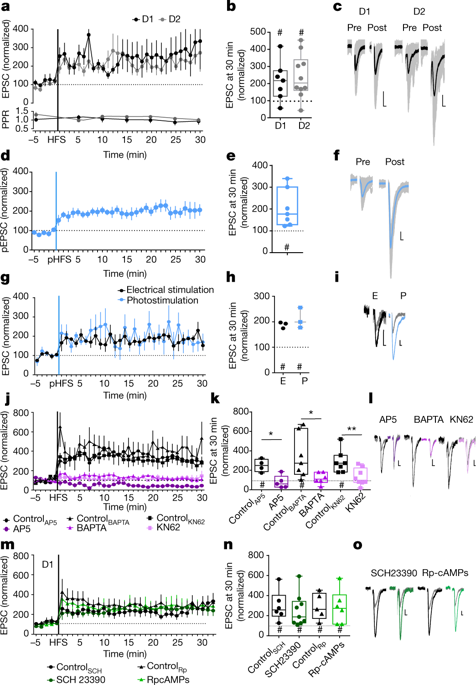Our official English website, www.x-mol.net, welcomes your
feedback! (Note: you will need to create a separate account there.)
Reward behaviour is regulated by the strength of hippocampus–nucleus accumbens synapses
Nature ( IF 50.5 ) Pub Date : 2018-11-26 , DOI: 10.1038/s41586-018-0740-8 Tara A LeGates 1 , Mark D Kvarta 1, 2 , Jessica R Tooley 3 , T Chase Francis 4 , Mary Kay Lobo 4 , Meaghan C Creed 3 , Scott M Thompson 1, 2
Nature ( IF 50.5 ) Pub Date : 2018-11-26 , DOI: 10.1038/s41586-018-0740-8 Tara A LeGates 1 , Mark D Kvarta 1, 2 , Jessica R Tooley 3 , T Chase Francis 4 , Mary Kay Lobo 4 , Meaghan C Creed 3 , Scott M Thompson 1, 2
Affiliation

|
Reward drives motivated behaviours and is essential for survival, and therefore there is strong evolutionary pressure to retain contextual information about rewarding stimuli. This drive may be abnormally strong, such as in addiction, or weak, such as in depression, in which anhedonia (loss of pleasure in response to rewarding stimuli) is a prominent symptom. Hippocampal input to the shell of the nucleus accumbens (NAc) is important for driving NAc activity1,2 and activity-dependent modulation of the strength of this input may contribute to the proper regulation of goal-directed behaviours. However, there have been few robust descriptions of the mechanisms that underlie the induction or expression of long-term potentiation (LTP) at these synapses, and there is, to our knowledge, no evidence about whether such plasticity contributes to reward-related behaviour. Here we show that high-frequency activity induces LTP at hippocampus–NAc synapses in mice via canonical, but dopamine-independent, mechanisms. The induction of LTP at this synapse in vivo drives conditioned place preference, and activity at this synapse is required for conditioned place preference in response to a natural reward. Conversely, chronic stress, which induces anhedonia, decreases the strength of this synapse and impairs LTP, whereas antidepressant treatment is accompanied by a reversal of these stress-induced changes. We conclude that hippocampus–NAc synapses show activity-dependent plasticity and suggest that their strength may be critical for contextual reward behaviour.Dopamine-independent induction of long-term potentiation at hippocampal synapses onto the nucleus accumbens modulates reward-related behaviour.
中文翻译:

奖励行为由海马-伏隔核突触的强度调节
奖励驱动动机行为,对于生存至关重要,因此保留有关奖励刺激的背景信息存在强大的进化压力。这种驱动力可能异常强烈,例如成瘾,也可能异常弱,例如抑郁症,其中快感缺乏(对奖励刺激的反应丧失快乐)是一个突出的症状。海马对伏隔核 (NAc) 外壳的输入对于驱动 NAc 活性很重要1,2,并且该输入强度的活动依赖性调节可能有助于正确调节目标导向行为。然而,对于这些突触诱导或表达长时程增强(LTP)的机制几乎没有可靠的描述,而且据我们所知,没有证据表明这种可塑性是否有助于奖励相关行为。在这里,我们表明高频活动通过典型但不依赖多巴胺的机制在小鼠海马-NAc 突触处诱导 LTP。体内该突触处的 LTP 诱导驱动条件性位置偏好,并且该突触的活动是条件性位置偏好响应自然奖励所必需的。相反,慢性压力会导致快感缺乏,从而降低突触的强度并损害 LTP,而抗抑郁治疗则伴随着这些压力引起的变化的逆转。我们得出的结论是,海马-NAc 突触表现出活动依赖性可塑性,并表明它们的强度可能对情境奖励行为至关重要。海马突触对伏核的长期增强的多巴胺独立诱导可调节奖励相关行为。
更新日期:2018-11-26
中文翻译:

奖励行为由海马-伏隔核突触的强度调节
奖励驱动动机行为,对于生存至关重要,因此保留有关奖励刺激的背景信息存在强大的进化压力。这种驱动力可能异常强烈,例如成瘾,也可能异常弱,例如抑郁症,其中快感缺乏(对奖励刺激的反应丧失快乐)是一个突出的症状。海马对伏隔核 (NAc) 外壳的输入对于驱动 NAc 活性很重要1,2,并且该输入强度的活动依赖性调节可能有助于正确调节目标导向行为。然而,对于这些突触诱导或表达长时程增强(LTP)的机制几乎没有可靠的描述,而且据我们所知,没有证据表明这种可塑性是否有助于奖励相关行为。在这里,我们表明高频活动通过典型但不依赖多巴胺的机制在小鼠海马-NAc 突触处诱导 LTP。体内该突触处的 LTP 诱导驱动条件性位置偏好,并且该突触的活动是条件性位置偏好响应自然奖励所必需的。相反,慢性压力会导致快感缺乏,从而降低突触的强度并损害 LTP,而抗抑郁治疗则伴随着这些压力引起的变化的逆转。我们得出的结论是,海马-NAc 突触表现出活动依赖性可塑性,并表明它们的强度可能对情境奖励行为至关重要。海马突触对伏核的长期增强的多巴胺独立诱导可调节奖励相关行为。











































 京公网安备 11010802027423号
京公网安备 11010802027423号